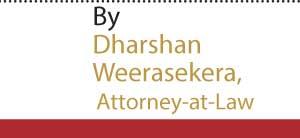Reply To:
Name - Reply Comment
Right of Reply to Sumanthiran’s observations on Chandrasoma v Senathirajah case

I take exception to an observation by Mr M. A. Sumanthiran PC in an article titled, “Legal challenges faced by the Federal party in its 70-year history,” Daily Mirror, 27 December 2019.) He says that in the said case the court endorsed or approved advocacy of a confederal form of government in this country. I was the Counsel for the Petitioner in that case and consider it my duty to set the record straight in the public interest. 
My learned friend says, “According to the judgment (i.e. Chandrasoma) on the basis of sovereignty and self-determination the ITAK has the right to advocate for a confederal form of governance. The judgment affirmed our Party’s historic position.” (Daily Mirror, 27-12-2019). The court does nothing of the kind. Instead, this is what the court says:
“It is established that there is a clear distinction between the words “federation” and “confederation.” The main issue, in this case, is whether advocating the establishment of a federal state is tantamount to the establishment of a separate state….The Thirteenth Amendment to the Constitution devolved power to the provinces. The ITAK is advocating for a federalist form of government by devolving more power to the provinces within the framework of a unitary state. Advocating for a federal form of government within the existing state could not be considered as advocating separatism. (SC/SPL/3/2014, p. 17)
"To grant they do be to concede that an ethnic minority in any country, simply on the grounds that they happen to predominate in a particular area at a given point in time, can invoke a right to “sovereignty and self-determination,” hoist a flag, and declare independence"
Clearly, in the above, the court’s conclusion that “federalism” (understood as devolution of power”) is permissible within the existing state is based on the fact that in the court’s view the 13th Amendment has already started that trend. In other words, the political reality created by the 13th Amendment is the basis for the Court’s conclusion, not considerations about a purported right of Tamils to “sovereignty and self-determination.” So, Chandrasoma can in no way be cited in support for the idea that our courts have endorsed confederalism. It is vital that members of the public understand this.
I must now say a word about the purported right of Tamils to “sovereignty and self-determination” in Sri Lanka, which is really the basis of my learned friend’s (not the court’s) arguments. The undeniable reality is that the Tamils have no such right. The Tamils are an ethnic/linguistic group, one among others including the majority Sinhalese who call this island home. The Tamils do not have special rights to any particular region of this country, to the exclusion of the others.
For instance, the North and East, especially the North, is just as much the historical habitation of the Sinhalese as it is of the Tamils. My learned friend and those of his ilk might benefit from consulting the work of persons such as Dr Senarat Parnavithana, an unimpeachable authority, on the history of the Jaffna Peninsula. Here, for instance, is Dr Paranavithana commenting on Vadamaracci, an area in Jaffna that in recent years has become famous as a bastion of Tamil militancy but in ancient times appears to have been a thriving Sinhalese settlement. He says:
“Vallipuram, a village in the Vadamaracci division of the Jaffna District, is one of the places in the Jaffna Peninsula now densely peopled by Hindu Tamils, where have been found remains of the Sinhalese Buddhist civilization which flourished in this extreme northern district of Ceylon during the earlier periods of its history. The stretch of sandy waste between the village and the sea is said to be strewn with vestiges of ancient human habitations over an area of about four miles in length and a mile in breadth, foundations of buildings, bricks, pottery and coins were occasionally brought to light by villagers digging there.” (Valliupuram Gold-Plate Inscription of the Reign of Vasabha,” S. Paranavthana, Epigraphia Zeylanica, Vol. I, 1934-41, p. 237.)
As I said, my learned friend and his cohorts can benefit from such commentaries, which to repeat are voluminous. In these circumstances, no one can deny that the Sinhalese have moral and historical rights in the North and East of the country, and this would include the right of return. Accordingly, the Tamils do not have a right to self-determination in those areas adverse to that of the Sinhalese. No self-respecting expert on international law will grant that the Tamils have such rights either.
To grant them is to concede that an ethnic minority in any country, simply on the grounds that they happenned to predominate in a particular area at a given point in time, can invoke a right to “sovereignty and self-determination,” hoist a flag, and declare independence.
"To grant is to concede that an ethnic minority ...simply on the grounds that they happenned to predominate in a particular area at a given point in time, can invoke a right to sovereignty and self-determination"
If that were possible, then Tamils in England, Canada, Australia and such could sue for “Eelam” in those countries, and the international community would have to endorse the said claims as well. Closer to home, the Tamils in Tamil Nadu would be able to invoke a right to sovereignty and self-determination and demand a separate State. My learned friend knows better than I what would happen if they dared do such a thing in India.
The point is that the Tamils of Sri Lanka do not have a right to sovereignty and self-determination adverse to the rights of the Sinhalese and other groups in the country.
To persist in peddling such views, in my humble opinion, is to do a disservice to the Tamils themselves, especially the youth, who have always been the ones to bear the brunt of suffering when the “soaring aspirations’ of their leaders go awry.